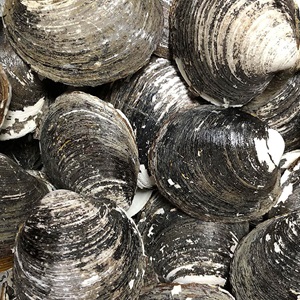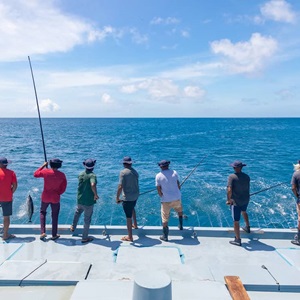By Nick Wyke
When Iberian sardine stocks dropped seriously low, the Portuguese and Spanish fishing sectors came together to ensure the livelihoods of fishers and the health of their beloved fish.
By the time the gear is loaded onto the Vitória Coentrão, it’s close to midnight when the crew sets out. The night at sea involves carefully setting the large net and hoping to gather fish in one haul.
"Purse seine fishing is one of the most beautiful fishing techniques in existence. It's like an art form when you see both the movement of the school of sardines and the gear," says Francisco Santos, captain of the Vitória Coentrão.
The 25-metre vessel returns after dawn, the rising sun casting a path back to the dock. They unload and sift the catch, a mass of silvery sardines, some of which will go fresh to the local cannery. The rest are destined for the clamour of the morning auctions, ready to shine on summer market stalls.
"What I like most is the adrenaline rush fishing gives me – arriving back on land with the fish we need because the day went well," reflects Adriano Pinto, the boatswain
on the Vitória Coentrão.
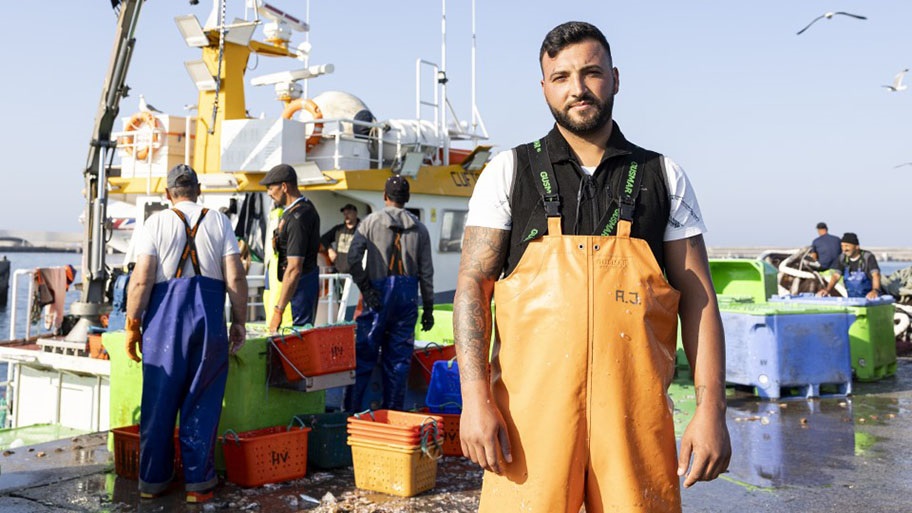
Adriano Pinto, boatswain on the Vitória Coentrão © Flymedia
Stock crash
This routine was initially disrupted 11 years ago, in the summer of 2014, when the Portuguese sardine fishery had its MSC certification suspended.
According to an independent surveillance report, carried out annually to ensure the fishery still meets the MSC Fisheries Standard, the fishery was no longer operating at a level that kept sardine stocks sustainable. A combination of poor recruitment (the number of new fish of reproductive age joining the stock), fishing pressure and shifting environmental conditions meant levels had been diminishing for years and were not recovering at the expected rate.
The situation went from bad to worse and by 2017 the stock was in a critical condition and the fishery was on the brink of complete closure.
A staple of the Portuguese and Spanish diet, a vital socio-economic resource and a cultural symbol for centuries, the celebrated "home-caught" sardine faced an uncertain future.
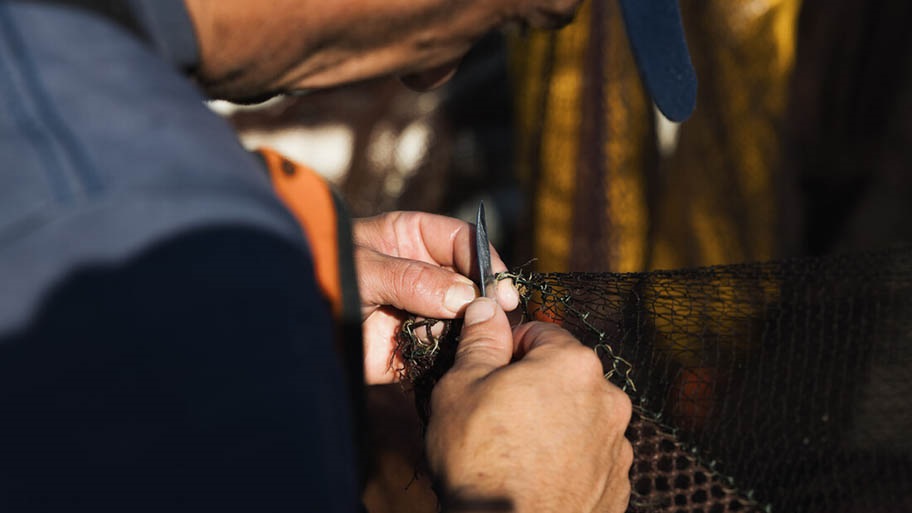
Fisher tends to net © @DavidVVisuals
Hard times
Santos came from a family of fishermen with "fishing in our blood". He recalls the terrible seasickness of the first night he went to sea in 1985, a callous north wind and the rocking boat. Like most fishermen Santos overcame that, growing to love and respect his chosen vocation. "Working every day at sea is a privilege," he says. "The ocean is my football pitch. It’s where I feel good." But without steady work, he was struggling.
It was a desperate time for many fishermen whose livelihoods depended on regular healthy catches. Faced with periods of unemployment, some tried to sell up while others were forced to switch to less profitable species like horse mackerel or anchovy. A
number of processing factories were left with no choice but to close or operate at reduced capacity.
"We went through great difficulties. Because we spent seven years, seven harvests, working four to five months and then sitting idle for
the rest of the year," says Santos. "There was no extra income, no subsidies from anywhere. Companies had to tighten their belts, reducing crews, fuel and the cost of nets. Eventually, I just couldn’t bring in any fish, so I went bankrupt."
“The situation highlighted the vulnerability of fishermen and the need for teamwork and perseverance to achieve sustainable fishing.”
MSC Program Director for Spain and Portugal
Building trust
These were years of "survival” according to Humberto Jorge, President of ANOPCERCO, the National Association of Purse Seine Producers’ Organisation, in Portugal. “We only operated for four or five months, with very low catch limits compared to what we were used to. But we managed to adapt and maintain this management mode without losing focus on the sustainability of the resource."
Fast forward almost a decade and the sardine stocks are in robust health. The Iberian purse seine fishery has been certified to the MSC Fisheries Standard, which requires the fishery to demonstrate that stocks are healthy, the fishery is well-managed and that environmental impacts are reduced. The certificate covers 317 vessels operating along the coast from the Bay of Biscay to the Strait of Gibraltar.
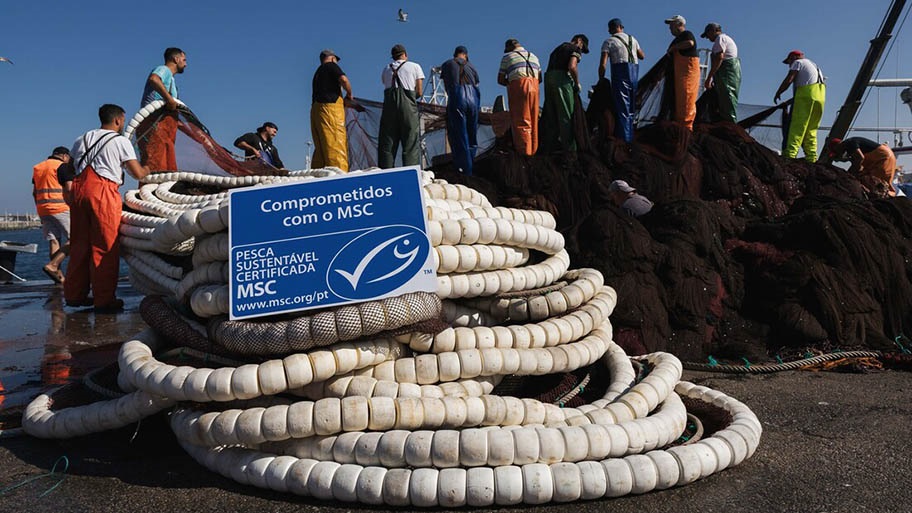
Newly certified. Fishers gather nets © @DavidVVisuals
The fishers played a vital role in the comeback. Fleets and governments from Portugal and Spain came together to turn things around. "They were helped by the fact that, from a technical point of view, business structures and, therefore, the vessels were very similar," adds Jorge.
They developed and agreed on a science-based management plan, with precautionary harvest control rules, closed seasons and annual catch limits based on the best available data.
"Nature also gave a hand, with several years of strong juvenile additions to the fishable stock," adds Alberto Martín, MSC’s Program Director for Spain and Portugal. While NGOs ensured civil society were heard and shared up-to-date data in different areas of marine conservation, particularly on the issue of interaction between vulnerable species and purse seine fishing.
The crisis rekindled a new partnership between scientists and fishers in Portugal. Since 2017, research vessels have been actively involved in national biological sampling campaigns led by the Portuguese Institute for the Ocean and Atmosphere (IPMA). Their involvement has allowed for a new approach in how schools of fish are identified.
Iberian sardine purse seine fishery
317
vessels
15
fisheries producer organisations from Spain and Portugal
3
key associations of the Portuguese food industry
“As well as participating in these research surveys, the fishers also gave us permission to have observers on-board at sea so we can collect information about the fishing effort, the species that are caught or interactions with top predators,” says Laura Wise, a stock assessor and data scientist at IPMA in Lisbon.
The collaboration has helped build mutual trust and improve the quality of data which informs a deeper understanding of fish stocks and how to manage them sustainably. It’s also shown that the fishing sector can play a key role in protecting the very resource it depends on.
"When fishermen base their catches on scientific advice - and when producer organisations are also aligned - the result is a success," says José Fernandes, Portugal’s Minister of the Sea. "It is a good example of what two countries can do in terms of stock recovery, obviously with the help of the entire sector."
Canning: pride and tradition
The whole sector includes the canneries that have long been an integral part of Portugal and Spain’s fisheries’ landscape. Many of these struggled, too, when sardine stocks came close to collapse in the middle of the last decade. But today new factories for canned seafood are being built in Portugal and Spain.
"No one more than us, the production and the fishing industry, has made the necessary sacrifices to ensure that this resource is recovered and that the importance of certification is maintained," says Dr José Freitas, President of the Portuguese National Association of Canned Fish Industries (ANICP).
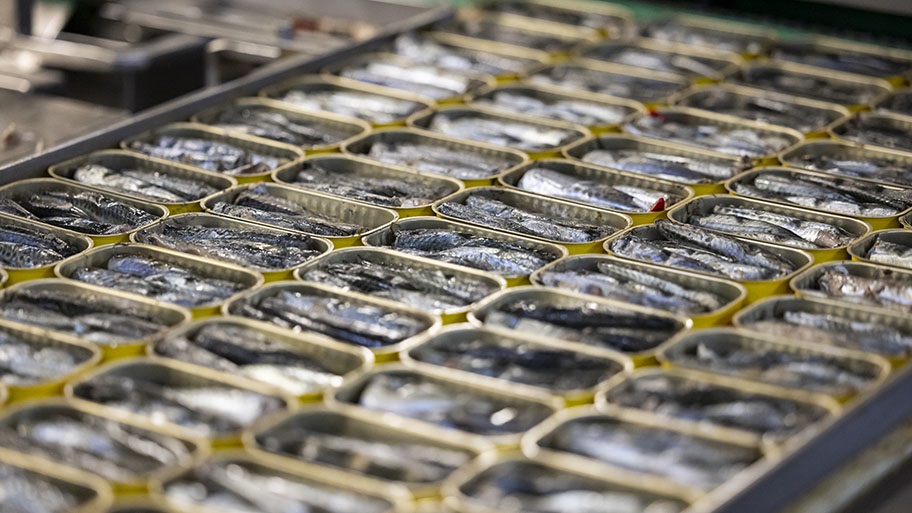
Freshly canned sardines at Conservas Portugal Norte © Flymedia
Canning is a historic trade with a modern outlook. Sardines are passed, as they have been for more than a century, through a brine solution. Then the head and guts are removed, and the tail is trimmed by a team of highly skilled women wielding razor-sharp scissors. It’s skilled, repetitive, and precise work – a core part of traditional sardine canning that machines still can’t fully replace.
"It’s a company rooted in pride and tradition but keen to secure its future by investing in long-term sustainability," says Cláudio Ribeiro, commercial manager of Conservas Portugal Norte, a canning business in Matosinhos, a port just north of Porto.
In the past decade, a new focus on quality, ethical sourcing and vintage design has enhanced the appeal of tinned fish. "Being a certified Portuguese sardine means combining tradition, culture and art with a commitment to traceability, which is what the MSC symbol gives us," adds Dr Freitas.
“Sardines have an umbilical relationship with Portugal; they are part of our culture and our life. There is no Portuguese home that does not have sardines during the summer, and there is practically no Portuguese person who does not eat sardines during the year.”
President of the National Association of Canned Fish Industries (ANICP)
Sustainable value
According to many stakeholders, MSC certification has played a central part in putting sardines back on the map. From fishers to retailers, the ecolabel resonates with everyone along the supply chain as consumers increasingly seek reliable information about the origin and sustainability of the seafood they purchase.
"Combining our high-quality sardines with the prestige of certification is the best thing that could have happened because everyone likes and wants something of quality," says skipper Santos.
In marketing terms, sardines have been elevated from once being seen as a basic ingredient for the poor to a nutritious, gourmet choice.
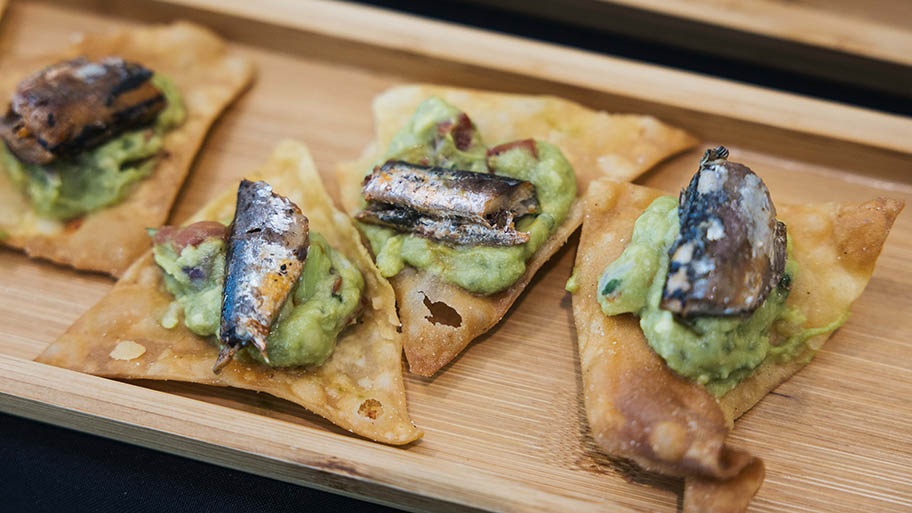
Sardine and guacamole tortillas © @DavidVVisuals
"It is a quality ready-to-eat product. It is almost like fast food, but extremely healthy, which is very important," says Ribeiro. "More and more people are realising this.
"With the added value of Iberian sardines now being MSC certified and all the concern for the blue economy and ocean sustainability, this is very important."
Fernandes labels Iberian sardines "a superfood from the Atlantic". He adds: "They are good for your health and help gastronomy and tourism. It is a product that has economic, social and cultural value, and this [MSC] label implicitly provides added value, making it possible to further strengthen this history and culture."
“For sardine consumers, the Blue Label means the product is backed by a trusted network of professionals working to do things right.”
MSC Program Director for Spain and Portugal
Ongoing challenges
Sustainable management plans are in place to strengthen the long-term viability of sardines and ensure there is no lapse back to the barren and distressing period that followed the fishery's suspension in 2014. However, an industry predicated on the vagaries of nature will always face challenges. And marine heatwaves and climate change remain serious concerns today.
As a small pelagic fish that lives in mid waters (neither shallow nor very deep) sardines are significantly impacted by water temperature. "They have a short lifespan and are very sensitive and vulnerable to environmental conditions, such as the temperature and availability of food,” says Laura Wise. "Especially when they are in their first life stage."
An international study shows that fish such as the European sardine are increasingly moving from their traditional Mediterranean environs to the North Sea and even the Baltic Sea as oceans warm rapidly. This will need to be monitored as shifting ocean currents and warming waters are changing the distribution of fish stocks and altering the structure of ecosystems.
Even with controls in place, fishing for sardines is unpredictable: "Every year is different. No two years are the same," says Santos. "This year has been a fantastic year for sardines, with good quality and size – it seems like they've come from heaven, Last year, for example, there were a lot of sardines, but they were poor quality."
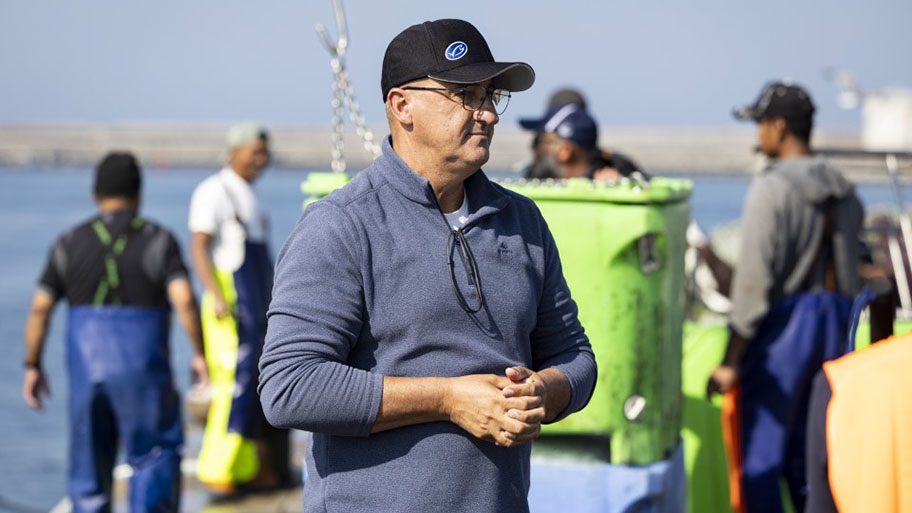
Francisco Santos, captain of the Vitória Coentrão © Flymedia
Toward a blue future
Through the collaborative efforts of fishers, producers, scientists and government Portugal hopes to ensure the survival of its cherished sardines for generations to come. A healthy stock ensures employment, pride and local economic stability.
People will continue to savour the smoky atmosphere of Lisbon’s Festival of St Anthony on 12 June and at dozens of other gatherings along the coast where the "silver of the sea" is the star of the show – tucking in to salt flecked grilled sardines with a chilled glass of Vinho Verde.
"Thankfully, we turned the page and are now in a fantastic era, with ten or 11 months of work, and good quality, certified sardines," says Santos.
“Fishermen work differently now. They have a mindset that goes out to sea today thinking about tomorrow.”
Captain of the Vitória Coentrão
10,000 tonnes
Portugal and Spain combined sardine quota in 2017
34,406 tonnes
Portugal's quota in 2025
17,332 tonnes
Spain's quota in 2025
Looking back on the crisis and loss of certification Ribeiro reflects: “It was difficult at the time. We all had to readjust and adapt. But from now on, we will all make a joint effort to ensure that this no longer happens and that MSC labelled sardines are a regular feature on the shelves."
The last word goes to a proud skipper Santos: "Without a doubt we have made mistakes in the past, but we learned from them. Today, with new ideas, new cultures, new jobs and new machinery, we are committed to sustainable fishing so that everything works out well, both for consumers and fishermen."

